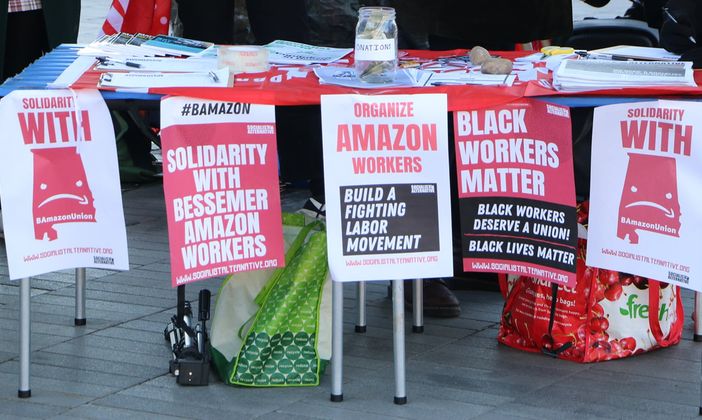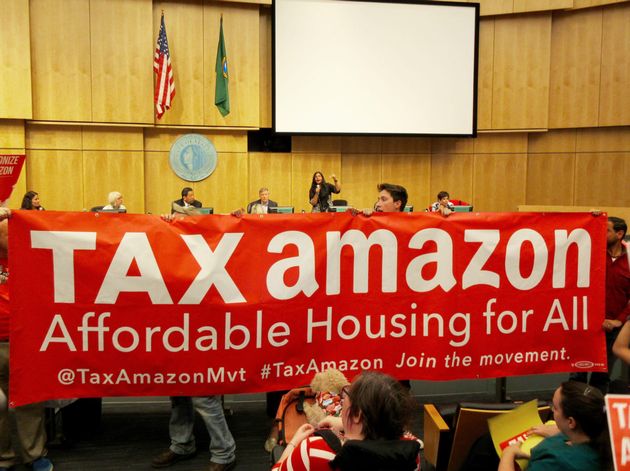Rebecca Green is a member of Socialist Alternative in the US.
Key Lessons for the Fight to #UnionizeAmazon
Socialist Alternative has been on the ground in Bessemer for a number of weeks helping build the BAmazon struggle. The below article is based on our observations and ongoing work in Alabama.
Vote counting has come to a close in the historic union election in Bessemer, Alabama. While the count has not been certified, Amazon surpassed the 1,608 votes needed to overpower the union. This is no doubt a devastating setback.
Amazon’s unimaginable wealth and power, which has exploded since COVID while millions have gone hungry, was unleashed in Bessemer to crush the effort to form the first union at Amazon in the US. They knew that a victory in Bessemer would trigger a tidal wave of organizing efforts at Amazon facilities across the country. They knew that Amazon workers organizing in their own interests was a direct threat to their brutal profit-making-machine. That’s why they pulled no punches in stopping the union drive. But this defeat is certainly not the end of the battle in Bessemer, or the end of the battle between working people and Amazon everywhere.
Amazon Stole This Election
The critical questions facing working people across the country in the wake of this defeat are: how did this happen? Is Amazon too big to beat?
The overarching cause for this defeat is Amazon’s brutal union busting tactics which, when all is said and done, will have cost them millions in consulting fees. They arm-twisted city officials into changing traffic light patterns at the warehouse gates to stop union organizers talking to workers. They lied relentlessly to workers about what the union would do if the election won, and threatened to close the warehouse. They unremittingly pressured United States Postal Service to install an illegal mailbox at the warehouse, and then lied to workers about the deadline to vote so they would cast ballots early – before union organizers could reach them. They organized an ongoing barrage of captive-audience meetings to inoculate workers against the union which were then followed up with hundreds of anti-union text messages. These are just some of many examples that will be revealed of Amazon’s highly illegal, vicious union-busting strategy which overtook the warehouse like a heavy fog.
So what was Amazon so determined to protect? Every crooked manoeuvre by Amazon came from their need to protect at all costs their ability to make enormous profits off the backs of their workers. Workers who, while Jeff Bezos made $90 billion during the pandemic, were dying from contracting COVID-19 on the job, collapsing from inhumane productivity requirements, and peeing in bottles to avoid being punished or fired by the company’s barbaric “Time Off Task” (T.O.T.) tracking system.
Despite not resulting in a victory at BHM1, this drive has exposed people all over the country and the world to the fierce repression Amazon directs at their workers. This will no doubt contribute to deepening anger against inequality and, in time, more organizing drives at Amazon.
Battle Ahead in Bessemer
The Retail, Wholesale, and Department Store Union (RWDSU), who workers initially contacted to help with the union drive, will rightly appeal the loss for a new election on the basis that Amazon played dirty. However, this process could take months if not years. With a 10% per month turnover rate at the warehouse, the union will be essentially starting from scratch. We cannot allow this battle to get funnelled solely into a backroom conflict between lawyers. This will open the space for Amazon to further inoculate all their new hires against the idea of a union and retaliate against worker activists.
After the last union drive at Amazon in the US, leading worker Bill Hough in Delaware was fired just six months after the union was defeated. Workers and RWDSU in Bessemer urgently need to deepen their organizing in the warehouse and prepare to battle any threats to workers’ jobs. The broader community, other unions, locally and nationally can play a crucial role in backing workers up. Solidarity actions against Amazon’s union busting are already being called across the country this weekend in solidarity with a rally on the ground in Bessemer.
Amazon will undoubtedly go on the offensive after this defeat. They strategically challenged hundreds of ballots of pro-union workers, knowing that this would either stop them from being included in the final tally to make their win look even bigger, or it would kick the battle to the courts. They will make the fall out as messy as possible, and scream from the rooftops that the hassle of fighting for a union simply isn’t worth it.
We can’t let them get away with this. Amazon showed its teeth in Bessemer, demonstrating even more sharply the importance of workers getting organized to fight in our own interests. The labor movement needs a bold and combative strategy to counteract the narrative Amazon and big business will whip up. This means urgently drawing out the lessons of this defeat and putting those lessons into action.
With an 11% union rate across the country, and just 6% in the private sector, the vast majority of workers at the Bessemer warehouse had never been in a union before and had never participated in a union drive. Many workers simply don’t know what a union is. This is not their fault, but it reflects the extreme weakness of the US labor leadership in recent decades, particularly in the South where right-to-work legislation has undermined a history of militant labor traditions. Amazon seized on this and, with all its money and union-busting experience, had space to convince many workers that all a union does is take a cut of your paycheck and give you nothing in return.
In reality, unions are the key organizations working people have to collectively fight in their own interests against those of the bosses. We need to educate a whole new generation of workers about the importance of unions today as well as the rich tradition of union militancy which won us the weekend, the 40-hour workweek, the minimum wage, and countless other protections.
As the battle in Bessemer goes to the courts, every single worker needs to be talked to directly to convince them to support the union moving forward. To be most effective in reaching and convincing other workers to join the struggle, this would need to be led by Amazon workers themselves. This could include workers phone banking all the names the union has contact information for, launching house visits, meeting coworkers before and after shifts, and using all possible opportunities to bring discussion of the union into the workplace. All of this could be planned out in meetings of leading workers held to discuss next steps.
The Role of Organized Labor
Working under gruelling pandemic conditions, workers in Bessemer took the brave step of picking a fight with Bezos. It’s to the RWDSU’s credit that they boldly took the initiative where others didn’t, and attempted to win the first #AmazonUnion in the country, let alone picking that battle in a right-to-work state in the deep south where workers are facing extraordinary union busting. Thousands of pro-union cards were collected at the warehouse gates 24 hours a day for two months by mostly Black RWDSU organizers, many of whom were recruited directly out of poultry plants in rural Alabama.
There is a lot the union did right. They made clear the links between the class struggle and Black Lives Matter movement, as the majority Black workforce demanded that Black Lives Matter at work too. They made sure the world was watching, pulling in figures like Killer Mike and Bernie Sanders, developing an impressive media strategy that led to tens of thousands of articles on the union drive on every continent.
It would be a fatal mistake to dismiss outright the role of organized labor, or claim that the existing unions have become too fossilized to be effective as a tool of struggle. This mistake puts the emphasis on the form of organization rather than on the power of rank-and-file organizing to transform the unions. Unions in the Birmingham area and the Labor Council stepped up to mobilize support for the Bessemer Amazon workers. Their collaboration has made huge steps forward in building lasting labor solidarity, and points in the direction of how organized labor can play a leading role in taking on bigger fights across the country.
Moving forward, there will be real debates in the labor movement and among workers on how to win unions in non-union industries, and it is crucial that we review the lessons from this historic drive, both its strengths and weaknesses. While Amazon’s vicious union-busting is the primary reason for this loss, it is also important to discuss what RWDSU could have done differently. There was a general lack of active involvement of Amazon workers in developing the union’s strategy, an over reliance on a media strategy, and an under prioritization of developing a clear set of economic demands, such as a $20 starting wage, longer breaks, overtime pay for shifts over eight hours, and an end to TOT, around which the union would fight for if it won. There was also generally an over optimism from the union leadership about the likelihood of victory, which gave the impression that meetings of workers to discuss strategy and the way forward were unnecessary.
The severity of this defeat is an important lesson that mass media coverage and even an “all-out” approach by union organizers, cannot be a substitute for genuine shop floor organizing. There were key moments where Amazon’s blatant cheating could have been exposed and used to galvanize and strengthen shop floor organizing, like picketing Amazon’s illegal mailbox until it was removed, or removing anti-union messaging from bathroom stalls, etc. In our view, RWDSU’s national leadership is making a mistake by calling on the National Labor Relations Board, rather than the rank-and-file power of Amazon workers, to “hold Amazon accountable.” Instead, RWDSU needs to lay the groundwork for a rank-and-file driven fight in round two.
Amazon Can Be Beat
This loss will no doubt be demoralizing to millions who watched with bated breath as workers took on Jeff Bezos. This includes some on the left who have drawn the conclusion that the prospect for organizing new industries is futile. We wholeheartedly disagree with this. It would be disastrous for us to draw the conclusion that Amazon is too big to beat. A closer look at the work of Socialist Alternative in Seattle would disprove this theory fast. Working people in Seattle have defeated Amazon twice! First when they dumped over a million dollars into the local city council elections to kick out socialist Seattle City Councilmember Kshama Sawant who was fighting to “Tax Amazon,” an election we won anyway. And second when they launched a ferocious campaign against that Amazon tax, which we won anyway. Despite being a modern day giant, Amazon is not unbeatable and wherever workers land that first blow against them will set off an unstoppable chain reaction.
Taking lessons from Bessemer, where organizing drives at Amazon kick off, organizing committees should be rapidly established. These should be driven by workers from every department and shift, regularly discussing a strategy to win union recognition. The strength of these structures can be mobilized to then win a first contract. Amazon will always out-spend us, but we can outnumber them with a strong, democratic committee of worker leaders that can bring everyone in the workplace into the fight.
The logistics industry has grown immensely in recent decades. Amazon itself exploded under the pandemic as people were forced to rely more on their delivery services. The Suez Canal catastrophe provided some insight into the potential power of logistics workers: just one ship created a potential economic crisis and cut into the profits of many major corporations. In many cities, Bezos’ finely tuned profit-making empire relies on a few lanes of roadway. Job actions and protests at strategic chokepoints in the global logistics network can leverage tremendous power for militant workers to demand real concessions out of the billionaires.
Is the PRO-Act An Answer To What Happened in Bessemer?
Many on the left are already linking this defeat to the need to fight for the PRO Act, a bill that has passed the US House of Representatives and is waiting to be heard in the Senate. If passed, this law would allow unions to overrule “right to work” laws, ban captive audience meetings and other employer interference in union elections, legalize sympathy strikes, and more. Had this been in place, it certainly would have helped in the Bessemer union election. If passed it would be the most significant victory in labor law in many decades, and we should fight for it. But there is a danger that labor leaders overly emphasize passing the PRO Act as a panacea, attempting to gloss over their own weaknesses and resistance to taking a bold, fighting approach.
In fact, it is this exact hesitancy from the labor leadership to take a class struggle approach that could doom the PRO Act. Given the fragile breakdown in Congress, the bill will not pass without real, mass mobilization of unions across the country. This would have to include organizing protests, rallies, and potentially targeted workplace action. If major unions mobilized their members to fight for the PRO Act and we win, this would be a dramatic step forward because not only would the bill become law – the labor leadership would prove itself willing to break through years of conservatism.
Bezos This is Just the Beginning
Across the country, over a thousand Amazon workers have already reached out to unions about getting organized. The Teamsters say they have already talked to hundreds of workers in Amazon warehouses in Iowa about unionizing. They say that their approach will be different than in Bessemer, and that instead of relying on the NLRB they will use strike action to bring Amazon to the table. Workers across Italy have been on strike over working conditions. Amazon may have cheated their way into a union defeat in Bessemer, but they can’t put the genie back in the bottle.
Amazon will seize on this defeat and ramp up retaliatory attacks against pro-union workers in Bessemer and beyond. We need to be prepared to ferociously defend against this. Any retaliatory firing should be met with an immediate fight back.
Watch out in the coming days for the lies the bosses want us to swallow. They want us to believe that Amazon is too big to beat, that winning unions is too hard. This will demoralize some people. But many will be filled with rage, because it’s not just Amazon. Workers everywhere are suffering, and found hope in this inspiring union drive because they need a union too. While Amazon has the money, we have the people, and we’ll be stronger in the next round. Bezos, this is just the beginning.



